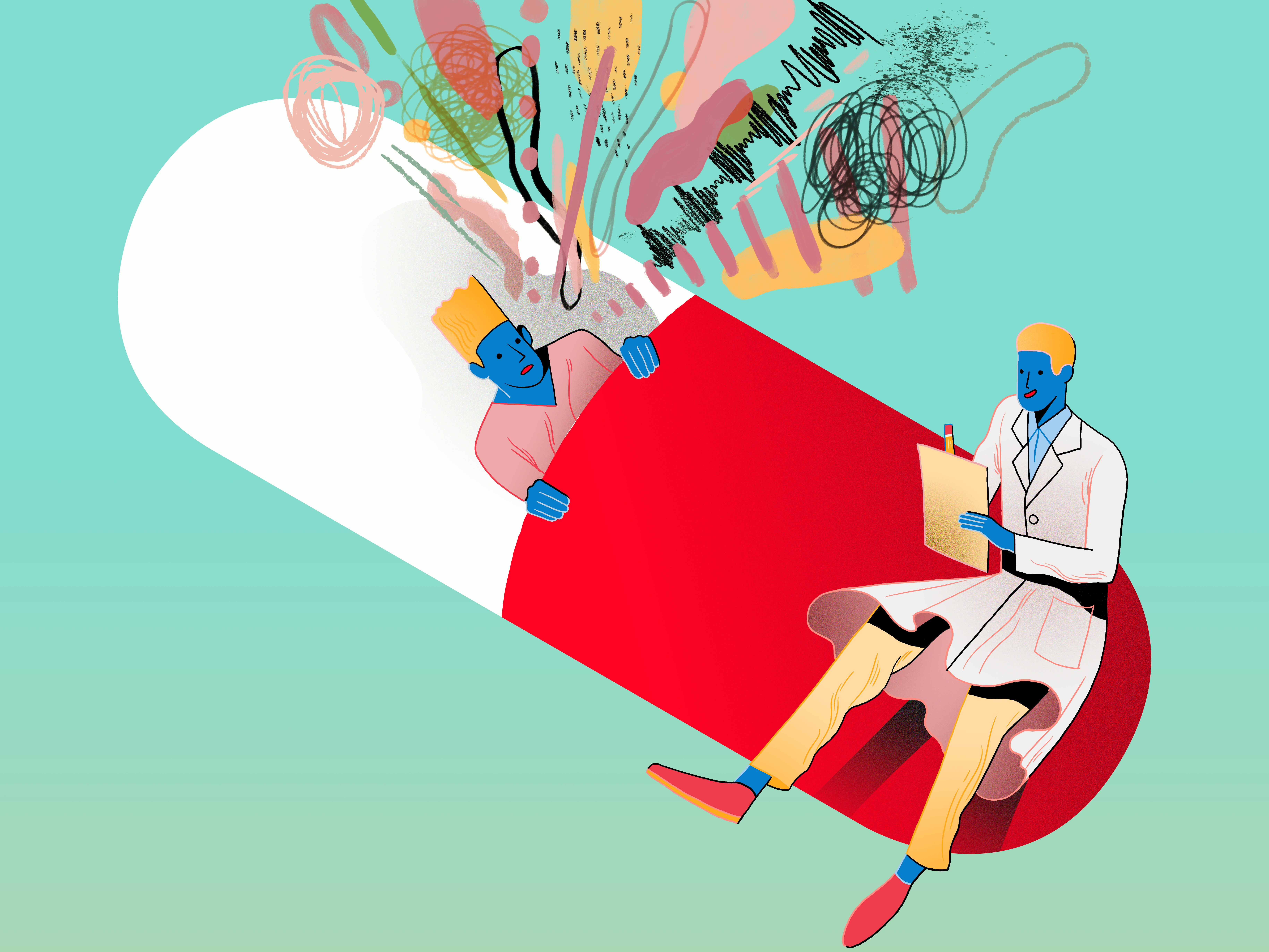One day in 2009, Roberto Ortiz received an urgent call. He was asked to make his way to a Montreal HIV clinic as soon as possible — a Spanish-speaking man had just received a positive result, and no one there was able to communicate with him.
Ortiz remembers this as one of his most meaningful experiences working in gay men’s health services. At the time, Ortiz, who had moved to Montreal from Mexico in 2009, was volunteering with the LGBTQ2 services group RÉZO.
As an on-call counsellor for pre and post rapid HIV testing, he provided support to people going through what can be a terrifying process. When he received that call, he rushed to RÉZO and learned that although the man had previously indicated he could speak English, the unexpected result had rendered him unable to communicate his distress. As someone still relatively new to Canada, Ortiz deeply empathized with this.
“I could identify with a lot of the things he was dealing with, coming from a similar culture,” Ortiz says.
Ortiz attended a few counselling appointments with the man to help translate, and later, when the situation began to improve, the man told him that having someone who spoke his language made a huge difference.
It was an emotional experience, heightened by the knowledge that the outcome might’ve been much worse if Ortiz hadn’t been there.
“As hard as it was on me that day, having the honour to be there and support him in that moment,” he says, “that was pretty special.”
It’s a prime example of something Ortiz calls the “dual role” — being a member of the community that you’re working for and supporting. And while it can be rewarding, it can also mean having to negotiate difficult and ever-evolving boundaries.
After receiving his master of communication degree from Concordia University in Montreal, Ortiz was eventually offered the position of executive director at MAX Ottawa, a health services hub for GBT2Q men.
“The “dual role” — being a member of the community that you’re working for and supporting.”
He was excited about it, but there were some important things to consider. One being whether he was ready to accept a job that, in his view, would put his identity as a gay man on display in his professional life. “I thought, ‘I’ll potentially be identified as who I am,’” he says.
Although he is out to his family and close friends, being so public about his sexuality was not something he was used to in Mexico.
Now, two years in to the role, Ortiz is glad he accepted it. But he was correct that such a community-oriented role would blur the lines between his personal and professional life.
“We are working by and with and for the communities we belong to,” Ortiz says. “If I want to go out to a bar and have fun, a lot of people know me as director of MAX — so it’s not always easy for myself or for other people to realize, ‘Okay, now I’m not working, I’m just Roberto having fun.’”
“Sometimes the work we do can have a different emotional impact in our own lives.”
“Sometimes the work we do can have a different emotional impact in our own lives.”
For Ortiz and others who are members of the communities they serve, the dual role can mean living with difficult contrasts.
As the men’s outreach coordinator for the AIDS Committee of Ottawa, Bryan Quiñones travels around the city to provide information about HIV/AIDS and support those seeking sexual health resources.
Quiñones, who uses the pronoun they, also works at GayZone, a weekly clinic for guys into guys that runs out of a local community health centre.
When it comes to the dual role, Quiñones says it can be beneficial because people tend to feel more comfortable asking them for support. But even that requires a delicate balance.
“Some of the people I work for will disclose some trauma in their lives, and it impacts me vicariously in that I feel their pain,” Quiñones says. And while they say it helps make them more dedicated to the work, Quiñones acknowledges that “a lot of the time as a worker, you’re emotionally exhausted.”
But Tyler Boyce, an anonymous HIV testing outreach worker housed at another local community health centre in Ottawa, says the dual role can have a lasting impact beyond day-to-day interactions.
“I’m gay and I’m also Black, and those are the two largest priority populations for HIV,” he says.
“So understanding how some things work and how some things don’t, I’ve learned through my work, but also just through my lived experience.”
Although Boyce is technically the sole employee, he works with others — like Quiñones — while out in the community, and also has a roster of anywhere from 10 to 12 volunteers who help out on different projects.
Boyce has heard time and time again from people in the African, Caribbean, and Black (ACB) community that there aren’t enough targeted HIV-related programs, even though that population is one of the most at-risk for new HIV contractions each year in Canada, next to men who have sex with men.
Since he’s a member of both communities, Boyce says, “Professionally, it’s a huge asset. Because I’m Black I’m able to bring that cultural knowledge, and because I’m bilingual — and a lot of Black folks in Ottawa are Francophone — I’m able to bring that cultural competence to the position.”
“I’ve learned through my work, but also just through my lived experience.”
Boyce points to a program started in Ottawa last year called Keeping It 100 (K1), a discussion group for queer and trans ACB men, as another prime example of this. His brother is one of the founders of K1, and Boyce says the program made it clear there was a community in need of something like it that hadn’t had the appropriate platform before. And it’s only grown since.
“Legend has it that it’s difficult to do outreach to ACB communities, but when you put people with lived experience in positions to be able to do that kind of outreach, you see a different result,” Boyce says.
“So it’s just a testament to folks with lived experience working with those same groups.”
Although Boyce doesn’t feel the job puts his sexuality at the forefront as much as Ortiz’s at MAX, for example, he’s aware that there’s a level of visibility that comes with it. But he says he views it as an opportunity to be a role model.
“At the end of the day you always want to make sure that folks feel comfortable using the service,” he says. “So you have to be a bit of an ambassador not only in your professional life, but when you take on a role that’s so community-oriented, you have to become an ambassador in your community as well.”
“I’m getting paid for doing something that I’m really passionate about.”
Ortiz says the fact that there are stable, salaried positions like his available for people to work in the communities they’re a part of is representative of positive progress. Although he acknowledges — as many in the public sector do — that with his level of education he could probably be making more in the private sector.
Quiñones, who started out as a volunteer at the organization they now work for, agrees, noting, “I’m getting paid for doing something that I’m really passionate about.”
Yet the communities that they, Ortiz, and Boyce serve still face discrimination and inadequate access to healthcare and other basic rights, things that can be hard to shake off at the end of the day.
Quiñones says one of the more difficult things they encounter is substance abuse and addictions. “I see a lot of people that I work with or people in the community who die of overdose, and it really impacts me.”
Recently one of the men who helped organize the narcotics anonymous group at GayZone passed away, and it was a profound loss for Quiñones. “I didn’t even realize I was grieving until I started to not feel very well emotionally, and I was kind of questioning why I was feeling that way.”
Quiñones spoke to a co-worker, who explained that, “being in this line of work makes you experience things you don’t normally experience in other types of work, because you’re taking care of the community that you’re a part of and seeing the people in your community die . . . and you just become devastated.”
“You’re taking care of the community that you’re a part of and seeing the people in your community die . . . and you just become devastated.”
Ortiz of MAX Ottawa says maintaining your mental health is one of the hardest things about the dual role. “If we want to be good for [the community], we have to be good with ourselves,” Ortiz says. “If we’re promoting mental health I have to be looking after my own health as well.”
MAX employees have counselling included in their benefits, and Ortiz and his co-workers try to debrief and talk through issues, as well as connect with other service providers as a means of a broader support network.
Quiñones takes a similar approach, noting that “because your personal life and your work life is very mixed together, checking in [with your co-workers] is very important.” In Quiñones’ experience, those who work for LGBT-oriented services are already attuned to this aspect of being supportive as a community.
“In GayZone the people who I work with closely, we provide support to each other, checking in on how people are doing is a culture that we already have in the line of work that we do.”
“If we want to be good for [the community], we have to be good with ourselves.”
But he says that what he feels most of the time is “such a joy and fulfillment that I’m able to hold this role, because I understand how important it is to the Black community and to the MSM [men who have sex with men] community, and to many of the other communities that I’m trying to serve as best as I can.”
The reality, as Boyce says, is that even with the challenges that a dual role brings, it provides a sense of duty and motivation that can radiate outwards and change important outcomes for people in all kinds of different communities.
“I do feel it’s very important for me to feel that sense of contribution, of making a difference,” Ortiz says. “As stressful as it gets, I go back home at night and feel like it’s worth it.”


 Why you can trust Xtra
Why you can trust Xtra


